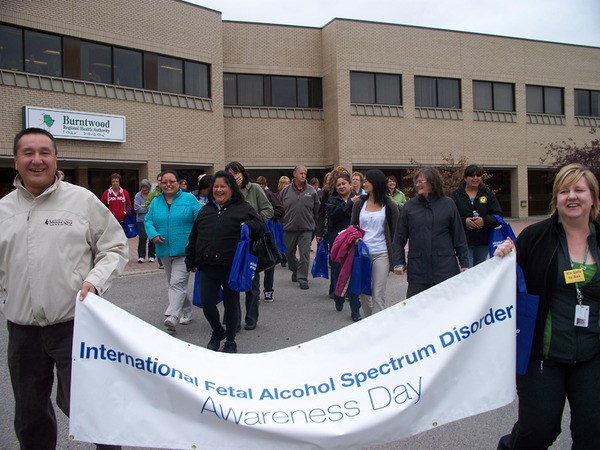Sept. 9 marked International Fetal Alcohol Spectrum Disorder (FASD) Awareness Day, a day which featured events and announcements across the province.
In Thompson, the big event was an FASD awareness walk held by the Burntwood Regional Health Authority (BRHA), with dozens of walkers heading into the brisk weather to take part.
In Winnipeg, a group of women arrived at the Legislature, having completed a 10-day, 810-kilometre trek from Norway House to raise awareness for the lack of FASD resources in First Nations communities.
The walkers were welcomed by Jim Rondeau, minister of healthy living, youth and seniors. "We welcome and congratulate the Norway House walkers as today they complete their journey to focus attention on fetal alcohol spectrum disorder," said Rondeau. "This is also International FASD Awareness Day, and we acknowledge the many caregivers who have dedicated their lives to support individuals of all ages who have FASD, many of whom need lifelong support and direction to successfully navigate through life."
Rondeau also announced new funding for FASD programs in Winnipeg, as well as a one-time grant to help develop FASD services across the province.
FASD is an umbrella term referring to three specific medical diagnoses: fetal alcohol syndrome, partial fetal alcohol syndrome, and alcohol related neuro-developmental disorder. "Central nervous system damage, primarily brain damage, is the main feature of all FASDs," explained Chantal McClelland, a co-ordinator with the BRHA's Insight program.
"There's still a number of people who aren't really aware of the effects of alcohol abuse when it comes to pregnancy," said McClelland. "It's prevalent everywhere. It's a matter of people not having access to enough information," she added, suggesting that low literacy rates are one such indicator.
According to McClelland, the only way to avoid FASD is to completely abstain from alcohol. "No alcohol means no risk," she said. "We do know that the more you drink the greater likelihood [of FASD], however nobody knows a safe amount. We really promote no alcohol, no risk."
McClelland said that half of all pregnancies in the area covered by the BRHA are unplanned, and that can contribute to FASD. "People drink alcohol while they're unaware [of the pregnancy], but they can still risk damaging that fetus whether or not they're aware of the pregnancy."
"We try to address the social determinants of health that impact upon women who might be using alcohol when they're pregnant and not necessarily realizing the risk," explained McClelland, noting that the BRHA does a lot of promotion, which leads to prevention.
"The first level of prevention is going out there to the community, making it broadly known," she said. "The second level is women a little more child-bearing age who might use alcohol and other substances, and the third we're more intensive, we're working with women who are having a more difficult time not using alcohol when they're pregnant - they may have an addiction, they may live in very difficult life circumstances and be using it to self-medicate. It's a tricky thing because women's addiction treatment is really not very accessible in Manitoba at this point. There are programs, but there's not a wealth of programs."
The BRHA's role in managing FASD doesn't end with abstinence awareness, however. Support is also offered to parents of children who have been diagnosed with FASD, as common parenting techniques often do not work in these cases.




